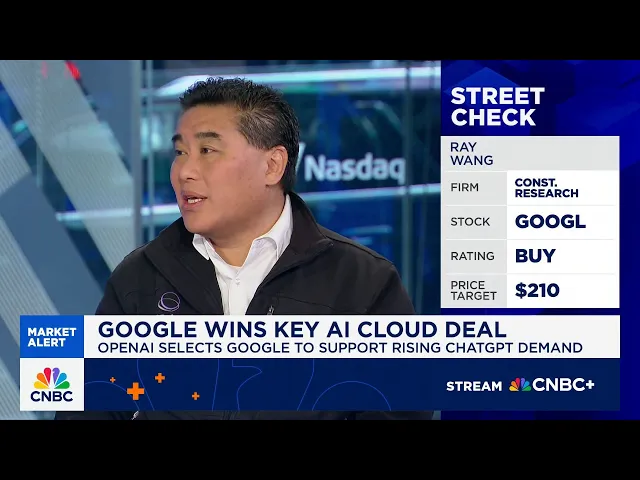Google might be in the lead in their AI capability, says Constellation’s Ray Wang

Google's growing lead in enterprise AI race
In the ever-accelerating world of artificial intelligence, the competitive landscape shifts almost weekly. A recent CNBC interview with Constellation Research's Ray Wang highlights Google's surprising momentum in the enterprise AI space, potentially surpassing rivals like Microsoft and OpenAI despite their earlier head start. As businesses scramble to implement AI strategies, Google's comprehensive approach to enterprise solutions may be creating a meaningful advantage that could reshape the competitive dynamics in this critical technological battleground.
Key Points:
- Google is gaining significant momentum in enterprise AI by addressing data integration challenges through their comprehensive data and cloud infrastructure capabilities
- Microsoft maintains strong positioning with Copilot, but their focus on consumer-facing technology has potentially opened a gap for Google in deep enterprise integration
- Investor sentiment is increasingly shifting toward Google as analysts recognize their improving competitive position in AI implementation
The Enterprise Integration Advantage
The most insightful takeaway from Wang's analysis centers on Google's approach to the fundamental challenge of enterprise AI: data integration. While competitors have focused heavily on model capabilities and consumer-facing applications, Google has quietly built a more holistic approach that addresses the messy reality of enterprise data environments.
"They can actually take the data, they can actually make sense of it, they can put it into a model, they know what to do," Wang explained. This reflects a crucial understanding that enterprise AI success requires more than just powerful models—it demands seamless integration with existing data infrastructure, robust governance, and flexible deployment options.
This matters tremendously in the current business environment because most enterprises aren't starting from scratch. They have decades of accumulated data spread across disparate systems, often with significant quality and accessibility issues. Google's approach, leveraging their deep expertise in data management and cloud infrastructure, directly addresses this pain point that many organizations face when attempting to operationalize AI.
Beyond the Transcript: The Multimodal Enterprise Reality
What the interview didn't fully explore is how Google's advantage extends beyond text-based AI into multimodal capabilities crucial for enterprise applications. Google's Gemini models demonstrate impressive capabilities in processing and generating content across text, code, audio, and images—a necessity for businesses dealing with diverse information formats.
Consider manufacturing firms that need AI systems capable of processing equipment sensor data, maintenance records, technical documentation, and even visual inspection data simultaneously. Google's investments
Recent Videos
How To Earn MONEY With Images (No Bullsh*t)
Smart earnings from your image collection In today's digital economy, passive income streams have become increasingly accessible to creators with various skill sets. A recent YouTube video cuts through the hype to explore legitimate ways photographers, designers, and even casual smartphone users can monetize their image collections. The strategies outlined don't rely on unrealistic promises or complicated schemes—instead, they focus on established marketplaces with proven revenue potential for image creators. Key Points Stock photography platforms like Shutterstock, Adobe Stock, and Getty Images remain viable income sources when you understand their specific requirements and optimize your submissions accordingly. Specialized marketplaces focusing...
Oct 3, 2025New SHAPE SHIFTING AI Robot Is Freaking People Out
Liquid robots will change everything In the quiet labs of Carnegie Mellon University, scientists have created something that feels plucked from science fiction—a magnetic slime robot that can transform between liquid and solid states, slipping through tight spaces before reassembling on the other side. This technology, showcased in a recent YouTube video, represents a significant leap beyond traditional robotics into a realm where machines mimic not just animal movements, but their fundamental physical properties. While the internet might be buzzing with dystopian concerns about "shape-shifting terminators," the reality offers far more promising applications that could revolutionize medicine, rescue operations, and...
Oct 3, 2025How To Do Homeless AI Tiktok Trend (Tiktok Homeless AI Tutorial)
AI homeless trend raises ethical concerns In an era where social media trends evolve faster than we can comprehend them, TikTok's "homeless AI" trend has sparked both creative engagement and serious ethical questions. The trend, which involves using AI to transform ordinary photos into images depicting homelessness, has rapidly gained traction across the platform, with creators eagerly jumping on board to showcase their digital transformations. While the technical process is relatively straightforward, the implications of digitally "becoming homeless" for entertainment deserve careful consideration. The video tutorial provides a step-by-step guide on creating these AI-generated images, explaining how users can transform...
